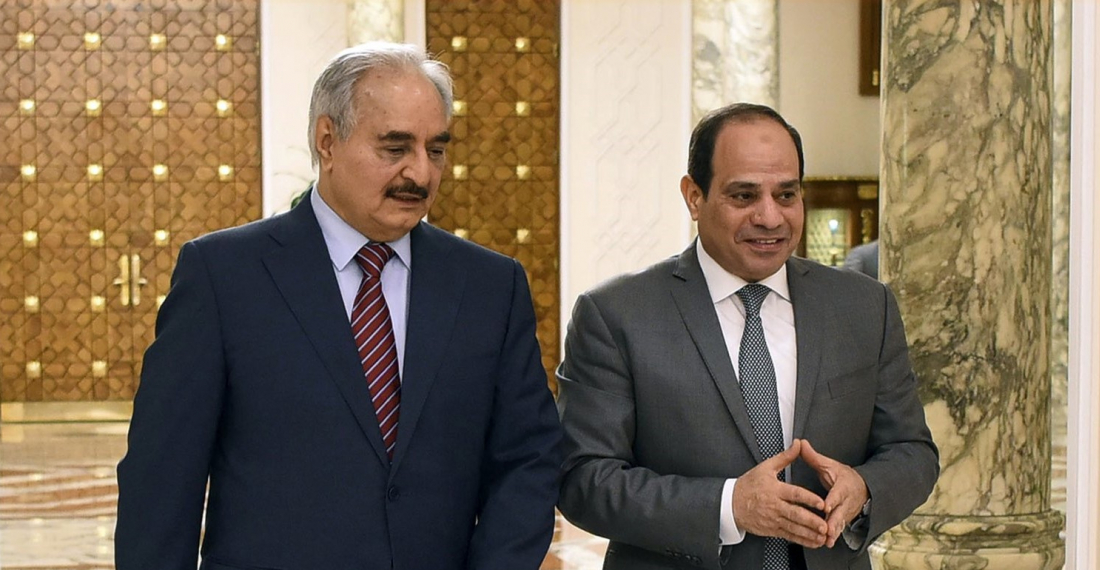Egypt is now the second country after Turkey to consider military operations in Libya. In this op-ed, Noman Ahmed discusses the reasons, and the implications for the European neighbourhood
Over the past few months, Libya witnessed rising tensions between the country's two major warring factions, the Eastern-based House of Representative (HoR) with its Libyan National Army (LNA) and the UN recognised Government of National Accord (GNA) in the west of the country. The escalation resulted in a shift of power towards the GNA giving it significant territorial gains towards the South and the East. The shift was primarily possible because of Turkish logistical and air support. The LNA, which had been besieging Tripoli for months, has now fallen back to a new frontline around Sirte, which lies midway across Libya's long Mediterranean coastline. Diplomatic tensions are also on the rise between the regional allies of the two factions, including European countries. One of the more significant diplomatic escalations is that between Egypt and Turkey with the former considering military action against the GNA "if the Egyptian national security is threatened". A military confrontation in the Mediterranean, could potentially involve Turkey and further complicate peace prospects in Libya itself.
Until the beginning of this year Libya appeared caught in a stalemate with Haftar's LNA controlling much of the Western parts of the country and surrounding its capital Tripoli. The Siege of Tripoli caused major distress for the local population and the GNA. With the world busy dealing with a health pandemic, Turkey escalated its air and on-ground support to the GNA enabling them not only to advance, but also to cause military and political embarrassment for the LNA and its allies. With Russia distracted by having to deal with an oil leakage as well as covid-19, Haftar's closest ally, Egypt, stood up against the advance of GNA. The allies of the two factions in Libya have so far provided military and political support, albeit only to a point. Egypt is now the second country after Turkey to consider military operations in Libya if the GNA advances any further into HoR territory, and closer to Egypt's borders.
Cairo has legitimate reasons to worry about Libya, and these reasons lie not solely in political friendship with Haftar. Despite the rising tensions between Turkey and Egypt on several issues, the primary threat to Egypt lies in the Islamist sympathies within the GNA. Egypt has a very toxic relationship with Islamists factions on its own territory and in the broader Arab homeland, and their influence both locally and regionally. The GNA has several Islamist leaders amongst its cadres. While the GNA might not be an Islamist government, many Islamist parties support the GNA. As Islamists sympathize with GNA, on the other hand, several liberal and moderate factions took the side of the Eastern-based HoR. Egypt is worried about potential Islamist control of the GNA if it was to gain more influence across Libya. Egypt and Libya share long, hard to police borders, and there is a risk of violence, trafficking, and terrorist attacks on and across the border. Egypt also wants to avoid the economic and political consequences of a poor security situation on the border. As GNA forces advanced towards the East, Egypt first offered a peace deal, but that was quickly turned down by the GNA. Egypt then considered military action if its national security is threatened. Egypt states that it is considering the use of all possible cards against an Islamist presence on its Western borders. President el-Sisi, speaking from a military base near the Libyan border, said that the Egyptian Army secures but does not threaten, adding that the armed forces are ready for any operations if called.
The current situation is alarming not only for the local Libyan parties but also for the wider region and Europe alike. On one side, the military escalations in Libya have derailed and perhaps ended the peace process with all parties informally rejecting the Skhirat agreement of 2015 that formed the GNA. On the other hand, escalation also weakens the ability of the local authorities to combat the Coronavirus outbreak. Previous agreements on cease fires and arms embargoes appear to be faltering.
The collapse of the peace process can have severe consequences for Europe too. Recurring violence can motivate another wave of immigrants and extremists alike. The tensions in Libya can also mirror into a wider confrontation in the Mediterranean between the EU and Turkey. Greece has already shown its frustration with the maritime border agreement between Turkey and the GNA. The stakeholders in a Mediterranean conflict can be diverse, and several scenarios could potentially unfold, especially amid NATO's ambiguity and indecisiveness due to difference of opinions on the matter between the member states themselves.
The GNA continues to refuse any foreign intervention, namely that of Egypt. On the other hand, Egypt has defended its right to intervene on the ground that HoR is an elected representative body, while Turkey says it supports the GNA as it is the UN-recognised government. Any peace and de-escalation efforts by European countries, and the local Libyan actors themselves, will have to consider the legitimate threat Egypt feels regarding the GNA's advance. The security of Libyans, but also the wider stability of the Mediterranean sea-lanes, should be the utmost priority of all actors involved in the Libyan conflict.
source: Noman Ahmed is Research Associate focusing on conflicts in Europe's Southern neighbourhood at LINKS Europe, and is currently finalising his post-graduate studies at Leiden University.
photo: A handout picture released by the Egyptian Presidency on May 9, 2019 shows Egyptian President Abdel Fattah al-Sisi meeting with the Head of the LNA, General Khalifa Haftar (L) at the Ittihadia presidential Palace in Cairo. (archive picture)
The views expressed in opinion pieces and commentaries do not necessarily reflect the position of commonspace.eu or its partners






